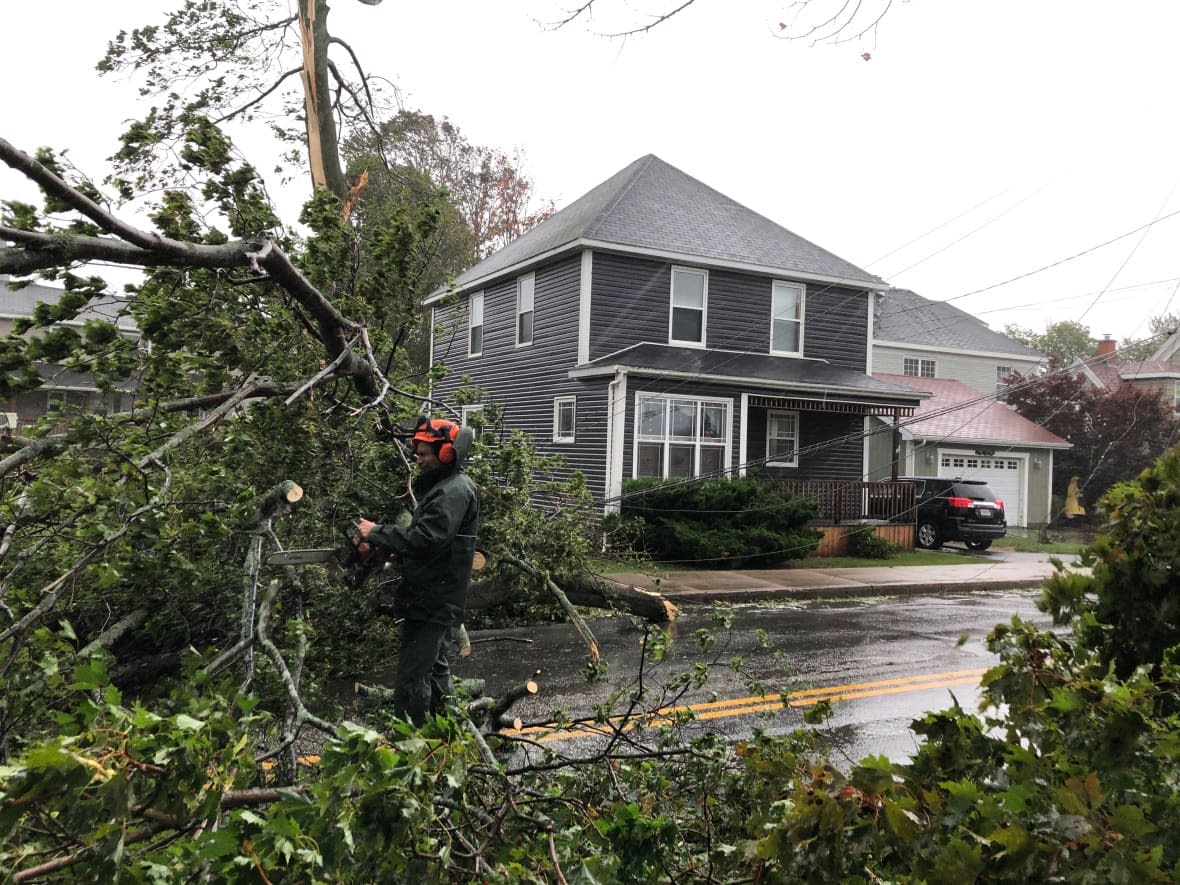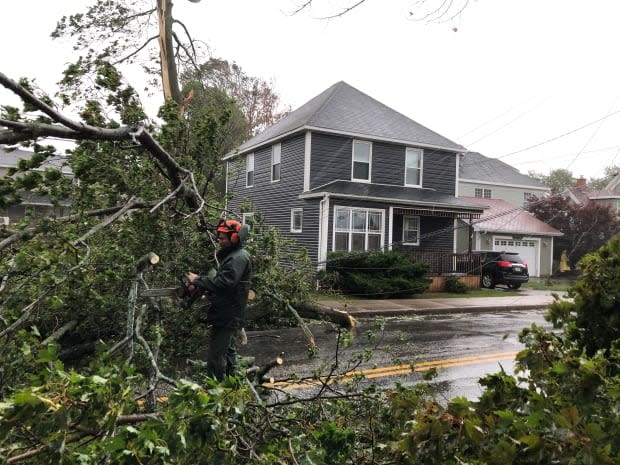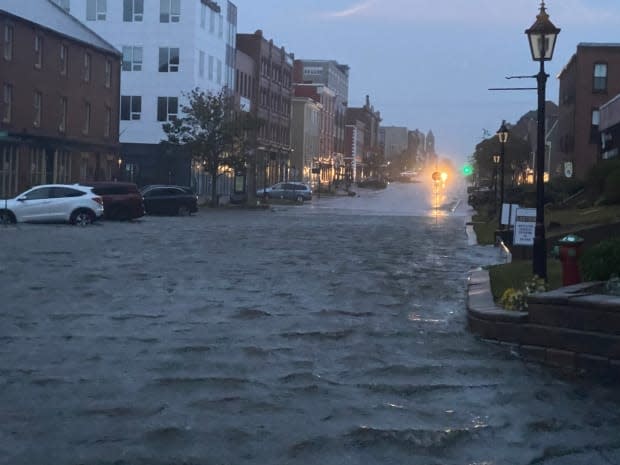Fiona smashes into Atlantic Canada, washing away homes and knocking out power

Hundreds of thousands of customers in Eastern Canada are without power as post-tropical storm Fiona brings intense, hurricane-strength winds and torrential rains to swaths of Nova Scotia, Prince Edward Island, New Brunswick, Newfoundland and Quebec's Magdalen Islands.
The town of Port aux Basques, N.L., has declared a state of emergency after storm surge swept away multiple homes and structures to sea.
Part of the town is also under a mandatory evacuation order. RCMP Cpl. Jolene Garland told CBC News that in some cases, residents have resisted leaving their homes.
"That's causing a lot of issues and a lot of concern," she said.
Garland said police have received an unconfirmed report that a woman has been washed out to sea. She said first responders haven't been able to reach that location because of the storm surge.
She said police received another report that a woman was washed out to sea after her home collapsed, but she was rescued and brought to the hospital.
WATCH | Storm surge washes away homes in Port aux Basques, N.L.
Landfall in Nova Scotia
Fiona made landfall in Nova Scotia shortly after 4 a.m. AT between Canso and Guysborough.
As of 5 p.m. AT, more than 350,000 Nova Scotia Power customers were without electricity. The company says it has more than 525,000 customers. It said people can go to the utility's outage map for estimated restoration times.
P.E.I.'s Maritime Electric said more than 82,000 out of a possible 86,000 customers were without power.
N.B. Power was reporting around 44,000 outages, concentrated in the province's southeast.
Newfoundland Power was reporting around 6,000 customers without power, and Hydro Quebec reported around 3,100 customers without power in the Gaspésie–Îles-de-la-Madeleine region and around 1,000 without power in Îles-de-la-Madeleine.
Hurricane or tropical storm warnings are in place throughout most of Atlantic Canada and southern Quebec.
State of emergency declared in Cape Breton
The Cape Breton Regional Municipality and neighbouring Victoria County have declared a local state of emergency and are asking residents to stay at home, unless where they are staying isn't safe.
Cellular networks down
Cellular networks were unreliable across Nova Scotia and P.E.I. Saturday. Many were unable to get a cell signal to make calls or access the internet.
Bell Aliant acknowledged the outages in a tweet posted Saturday morning. The telecom company said they were working with utility companies to restore full power to their cellular sites as soon as possible.
Rogers also tweeted they are aware of the outages and their local crews will work to get services up and running.
CBC News has contacted Bell Aliant and Rogers for an update on restoration times.
WATCH | Fiona's destructive aftermath in Halifax
Tree fell on fire truck with crew inside
Erica Fleck, the assistant chief of Halifax Regional Fire and Emergency, said a tree fell on a fire truck that had a crew inside. There were live wires.
She said the fire crew stayed in the truck as Nova Scotia Power technicians worked to get the crew out safely.
"The power lines are down everywhere," she said. "It's not safe to be on the roads."

In a tweet, Environment and Climate Change Canada said the highest wind gust reported in Nova Scotia has been 179 km/h in Arisaig, north of Antigonish on Nova Scotia's coast.
CBC meteorologist Tina Simpkin said wind gusts of 100 km/h were recorded in Moncton, N.B., shortly after 6 a.m.
Wind gusts of up to 100 km/h are expected in some areas of the province over the next 24 hours, with sustained winds clocking in at 65 km/h.
'Like nothing we've ever seen': Charlottetown police
In a tweet, Charlottetown police said they are logging reports of downed trees and wires but are only responding to emergency calls.
"Conditions are like nothing we've ever seen," the force said in a post on Twitter.
Nova Scotia Power's efforts to restore electricity are being hampered by strong winds.
"We're still seeing significant wind gusts, specifically Cape Breton," said Peter Gregg, company president and CEO. "Until those wind gusts come down, we won't be able to get crews out there. But we're making progress in Halifax."

Environment Canada said Fiona will reach the Quebec Lower North Shore and southeastern Labrador by late Saturday night.
The agency said severe winds and rainfall, large waves and storm surges were all occurring.
Environment Canada said rainfall will be significant, particularly north and west of Fiona's track, where it could lead to flooding. Some areas could see as much as 200 millimetres of rain. About 120 millimetres had already been reported in some weather stations in eastern Nova Scotia by 3 a.m.

Some waves along Nova Scotia's Eastern Shore could build to be more than 10 metres, with waves along southern Newfoundland on Saturday morning reaching higher heights.
"Waves over eastern portions of the Gulf of St. Lawrence and Cabot Strait could be higher than 12 metres," Environment Canada said.
WATCH | Fiona brings flooding to Charlottetown
It said the western Gulf will see waves from the north up to eight metres in some places, "which will probably cause significant erosion for north-facing beaches of Prince Edward Island."
The forecaster said the Magdalen Islands will also see some coastal erosion from waves.

Coastal flooding is a big concern for Nova Scotia, Prince Edward Island, the Magdalen Islands, eastern New Brunswick and southwest Newfoundland.
"The highest risk for coastal flooding will be a combination of storm surge with large waves moving onshore," Environment Canada said.
MORE TOP STORIES


